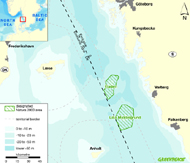
Photos from the hearing in Varberg
March 18, 2009The Fishermen in Halland are positive to placement of stones
March 18, 2009Stop bottom trawling in the sensitive seabeds of Fladen and Lilla Middelgrund through placement of stones?
“Damn good idea” according to the anglers. “No problem, unless our lobster trawling in the outskirts of the area is disturbed” says the fishermen in Halland. “We haven’t made any decision about permission yet, but the notification has been sent for comment” the local authorities announced.
The majority of the 30 visitors at Greenpeaces’s information meeting the 12th of March in Varberg wanted more and more powerful measures to protect the valuable areas in Kattegatt and particularly the reproduction areas. Staffan Danielsson, was overwhelmed by the fishermen in Halland´s positive reactions after the meeting.
“We now have a constructive dialogue with the fishermen in the region, which is amazingly positive. The question regarding areas closed to fishing – with or without trawling obstacles – is usually very infected, but here we’ve managed to meet on a common ground. This is unique situation regarding the context” he says.
The fishermen in Halland admittedly thought that the placement of stones is “unnecessary”, since they’re not trawling at the ground hard bottoms with the greatest biological value within the Nature 2000 areas, but neither were they opposed to the placement.
“We’ve prepared an action plan of our own, for how important areas in Kattegatt can be protected, but the response from the authorities have been zero so far. The media haven’t bothered to cover our proposals. The really positive thing about Greenpeace’s project is that these issues now are raised on the agenda”, says Viking Bengtsson, Chairman in the Halland district of the Swedish Fishermen National Organisation. Read the rest of this entry »
Hello and welcome!
March 13, 2009Dima Litvinov, Oceans Campaign
For the past ten years or so I have had the privilege of working with the Greenpeace Oceans campaign. The work has taken me to many parts of the world’s oceans – from the Baltic to the Pacific, from the Barents and Kara seas in the north to the Southern ocean; from small harbors in Argentina to large industrial European landing ports; from 100 meter super trawlers to 9 meter gill netters; from state-owned ships to rusty hulls with no flag and painted-over IMO numbers.
Over the years time and again I encountered a situation that seemed absurd, one that is not often encountered on dry land: a slow, complicated ineffective and often non-existent legislation for regulating human activities at sea. Not least have I seen this in the EU waters.
One often hears the opinion that EU’s waters are overregulated. I can almost agree with this. There is a great number of authorities who regulate different aspects of human activities in EU waters. At the same time it appears that the very plethora of regulators leads to UNDERREGULATION, a situation where important aspects fall between chairs, or are pushed from one table to another without any resolution.
I experience this underregulation – as a result in part of overregulation – in particular when it comes to protection of marine environment. No single EU body today has the possibility and responsibility to act to truly protect the marine ecosystems from negative human impact. Not least is this true if the negative impact is associated with fisheries.


